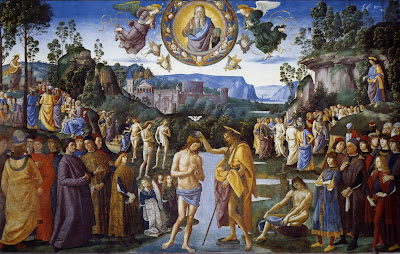When Jesus also had been baptized
The reason that we call January, as is the case
with the names of all the months, is
because ancient Roman religion dedicated the first month of the year to the god
Janus, the god of beginnings and transitions,
and thereby of gates, doors, doorways, passages and endings. He is
usually depicted as having two faces, since he looks to the future and to the
past. Janus presided over beginnings and endings.
So it must have seemed to the first pagan
converts to Christianity that the Baptism of the Lord was a natural celebration to have in
January, since before all else this feast is a feast of beginnings and ends and
of transition.
Today is the ending of the hidden life of Jesus
and the beginning of his public life and we can see already what his public
life will be like and where it will lead to. St. Luke tells us that the people
were ‘in expectation’ and today we should be in expectation as well.
First of all what happens at his baptism is
Jesus identifies himself with sinful men by the very fact that he allows
himself to be baptized. The baptism of John was not intended for the righteous,
the Pharisees. John does not welcome those who imagine themselves to be righteous:
“when he saw many of the Pharisees and Sadducees coming for baptism, he said to
them, ‘You brood of vipers! Who warned you to flee from the wrath to come? Bear
fruit that befits repentance’” John’s baptism was for those who knew that they
needed to repent.
“Jesus also was baptized.” Jesus allows himself
to be baptized, to be associated with the sinful. We see already the company he
will keep, those whom he will eat with, forgive and heal and finally die for,
you and me. In his first public act he makes clear who are his people and who
are not. Later through his Church, through Christian baptism he will receive
his own. Not that this is an easy pass on sin, a wink at sin, but the
humiliating descent into the water which is both death and new life.
If baptism, as St. Paul says, is really a
sharing in his death and burial and rising to new life, then his baptism is
already a prophecy of his own death and resurrection. Jesus will say “can you
be baptized with the baptism with which I am baptized?” Everything that happens
between his baptism and death is for us sinners. The baptism in the Jordan is a
baptism ‘with the Holy Spirit” – the baptism of the Cross is a baptism ‘with
fire.’ The first is the befriending of sinners who need cleansing; the second
burns away the sin of the whole world.
The Eastern Church calls the Baptism of the Lord
“the Theophany” –the revelation of God -- because the Triune God confirms the mission of
Jesus: the Father sends his ‘beloved Son’ to save and the Holy Spirit anoints
the Son to fulfill the promise of the Father.
The miraculous theophany The Sacrament of
Baptism in the name of the Father, the Son and the Holy Ghost gives us a share
in Jesus’ first baptism and his final baptism in blood. Again and again through
the Sacrament of Baptism the heavens open and the voice is heard “this
is my beloved son’. Again and again the gift of the Holy Spirit is given as the
baptized are anointed. Again and again the those being baptized and God reveals
the completeness of his determination to save mankind not because of their
deeds but because of his mercy.The beginning and end of the Gospel.
When Jesus also had been baptized


1 comment:
Thanks for that -- have you read Farrer on the Baptism? (Triple Victory, I think, excellent)
Post a Comment